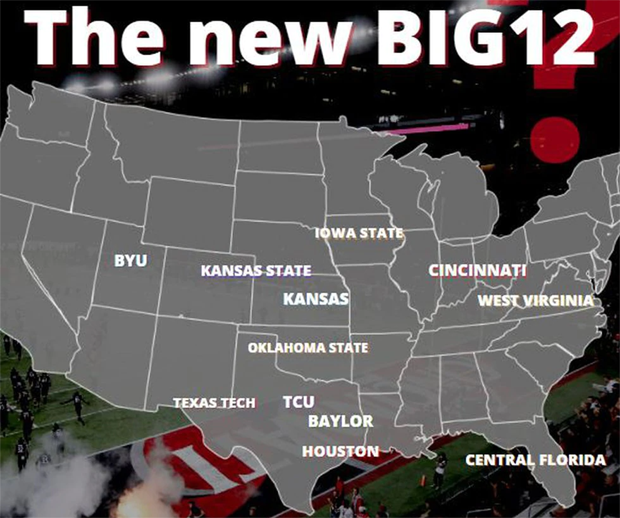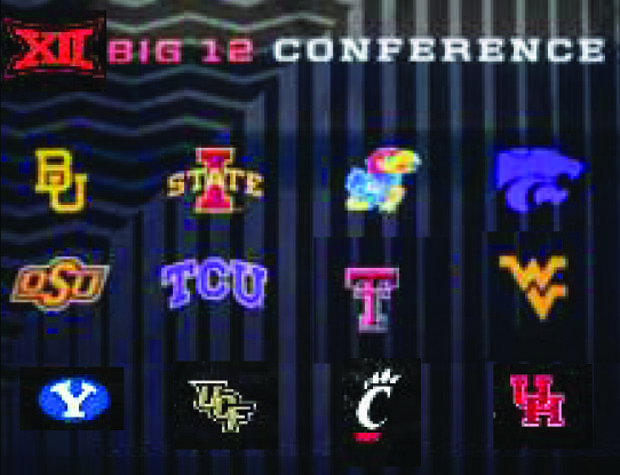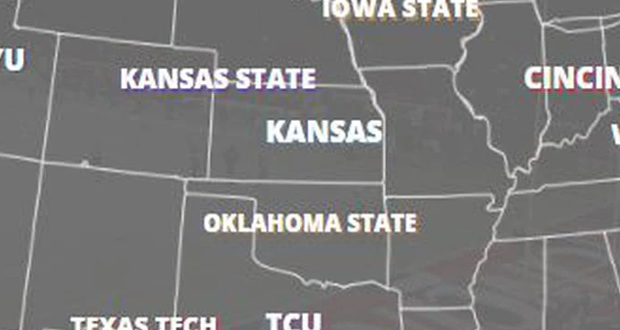The Big 12 Board of Directors voted Friday to extend membership invitations to Brigham Young University, the University of Central Florida, the University of Cincinnati, and the University of Houston.
All eight continuing members voted in favor of the invitation.
“The Big 12 Presidents and Chancellors entered this process with the singular focus to strengthen and stabilize the Conference,” noted Lawrence Schovanec, Chair of the Big 12 Board of Directors, and President of Texas Tech University. “With the addition of these four tradition-rich institutions we have set the Big 12 on a continued path of success. We look forward to having BYU, UCF, Cincinnati and Houston under the Big 12 banner, both athletically and academically.”

The new Big 12 covers a larger geographical area, but what teams will the two divisions consist of? Perhaps the difference in type size on this map from WXIX holds a clue? Or will it simply be the six northernmost schools against the six southernmost?
All four schools have now accepted the offer, joining current members Kansas, Kansas State, TCU, Baylor, Iowa State, Texas Tech, West Virginia and Oklahoma State. TCU and West Virginia were previously the newest members, having joined in 2011.
BYU is currently an independent in football and a member of the West Coast Conference in other sports. Cincinnati, Houston and UCF will arrive from the American Athletic Conference.
Back in July, Texas and Oklahoma accepted invitations to join the SEC in 2025.
READ: College of the Ozarks fighting policy that mandates coed housing
The plan calls for the four new members to begin play in the Big 12 in 2023.
Since plans called for Oklahoma and Texas to make their moves to the SEC in 2025, the Big 12 could be an awkward 14-team conference for two years.
Baylor athletic director Mack Rhoades had warned the conference that quick action was needed following the OU and UT news to avoid falling from the ranks of the college elite.
“The economic impact is real,” Rhoades said. “If we are no longer a member of a Power Five, we will sell less tickets, we will sell less merchandise, we will raise less money and we will have less corporate sponsorship.”
While the schools brought in by the Big 12 expansion may not have the national reach of Oklahoma and Texas, they should be enough to keep the conference in the Power Five group.
Founded in 1875, Brigham Young University is located in Provo, Utah. The campus is home to 33,181 undergraduate students, pursuing degrees in 186 majors. Athletically, the Cougars compete in 21 sports. They have won 12 NCAA titles all-time, claimed 296 conference championships; and have been home to 1,385 All-Americans, one Heisman Trophy winner, and 75 Olympians.
Men’s sports include baseball, basketball, cross country, football, golf, indoor track & field, outdoor track & field, swimming & diving, tennis, and volleyball. Its women’s sports are basketball, cross country, golf, gymnastics, indoor track & field, outdoor track & field, softball, soccer, swimming & diving, tennis, and volleyball. The Cougars participate in every sport sponsored by the Big 12 except equestrian, rowing, and wrestling. The Big 12 sponsors every sport the Cougars compete in except men’s volleyball.
Located in Orlando, Florida, the University of Central Florida is a metropolitan research university that was founded in 1963. UCF is recognized nationally for its innovation, affordability and for fostering social mobility. With approximately 70,000 students, 13 colleges and 230 degree programs, the university helps to develop the skilled talent needed to advance industry and solve society’s greatest challenges. In the 16 varsity sports UCF sponsors, Knights teams have won a total of 148 conference championships. In 2017 its football team capped an undefeated season with a Peach Bowl win over Auburn. Men’s sports include baseball, basketball, football, golf, soccer and tennis. Its women’s sports are basketball, cross country, golf, indoor track & field, outdoor track & field, rowing, soccer, softball, tennis, and volleyball. The Knights participate in every sport sponsored by the Big 12 except equestrian, gymnastics, swimming & diving and wrestling. The Big 12 sponsors every sport the Knights compete in except men’s soccer.
The University of Cincinnati is a public research university with an enrollment of 46,798. Founded in 1819, UC offers 414 degree programs. Over its athletics history, Bearcat teams have combined to win 116 conference championships. The men’s basketball program has accounted for 41 conference titles and two national championships. This past season, the UC football team took a perfect record and a #8 CFP ranking into a Peach Bowl date with Georgia.
Cincinnati sponsors 18 varsity sports. Men’s sports include baseball, basketball, cross country, football, golf, indoor track & field, outdoor track & field, and swimming & diving. Its women’s sports are basketball, cross country, golf, indoor track & field, lacrosse, outdoor track & field, soccer, swimming & diving, tennis, and volleyball. The Bearcats participate in every sport sponsored by the Big 12 except equestrian, gymnastics, men’s tennis, rowing, softball, and wrestling. The Big 12 sponsors every sport the Bearcats compete in except women’s lacrosse.
Established in 1927 the University of Houston is a Tier I research institution, with over 47,000 students enrolled in its 408 undergraduate, masters and PhD programs. Its athletic success includes 158 conference titles, 17 NCAA team champions, 1,059 All-Americans, 63 Olympians and one Heisman Trophy winner. Last season was highlighted by the men’s basketball team’s run to the Final Four.
Houston sponsors 17 varsity sports. Men’s sports include baseball, basketball, cross country, football, golf, indoor track & field, and outdoor track & field. Its women’s sports are basketball, cross country, golf, indoor track & field, outdoor track & field, soccer, softball, swimming & diving, tennis, and volleyball. The Cougars participate in every sport sponsored by the Big 12 except equestrian, gymnastics, men’s tennis, rowing and wrestling. The Big 12 sponsors every sport in which the Cougars compete.
A Big 12 source described the attraction of the prospective new additions being rooted in both TV market/audience and football relevancy. All four schools have had championship seasons in the last 10 years.
With the additions, the Big 12 will retain its status as an Autonomy 5 league, college football leaders believe. The NCAA granted autonomy powers in legislative matters to the Big Ten, SEC, Pac-12, ACC and Big 12, but the most important piece relates to the College Football Playoff. The Power 5 conferences hold lucrative bowl tie-ins as part of the CFP contract, which does not expire until after the 2025 season.
–Lee Hartman | Metro Voice
Go here to visit the Topeka Metro Voice Facebook page for local event notices, breaking news and local announcements. To help us spread the word, and to continue seeing our posts on your Facebook feed, “Like” the page and then like or share a post now and then, so that they will keep showing up in your feed.
Can You Help?
With many events being postponed, businesses closing or reducing hours. and churches reducing services, the advertising that the Topeka Metro Voice relies on for support has significantly been reduced as well. For over 15 years, Topeka Metro Voice has been a leader in community and faith-based news. We have historically relied on advertising to fund the mission of our publication and sharing the Good News, as well as supporting local small businesses and community events. We are now seeking supporters and partners who want to support our publication and our mission of faith-based journalism and supporting the community and local small businesses.
Do you like what you read here? Help us continue our mission by supporting the Topeka Metro Voice in print and online for as little as $5. Every contribution counts, big or small. We sincerely thank you for your continued support and encouragement in these critical times.








